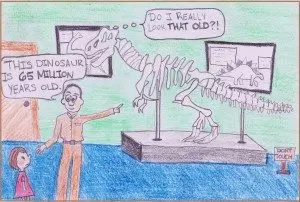Radioisotope Dating
Have you ever heard someone at a museum or on TV say something like this “ . . . this T-rex lived 65 million years ago . . .” and wonder how they come up with an age like that for something that we know from the Bible is positively not that old? Scientists get these dates through radioisotope (pronounced radio –iso-tope) dating, which can sound like a very frightening thing to study, and it very well can be if you study it in detail. However, we will not be going into too much detail about it here, so don’t worry.

What is a Radioisotope?
The word radioisotope is just short for radioactive isotope. Radioactive means very tiny bits of stuff that shoot out even smaller pieces very quickly, like a BB-gun shooting out little BB’s, just much faster and smaller. This is why radioactive things are sometimes dangerous. Isotopes are like a jar of jellybeans. There are many different colors but they are all jellybeans, not M&Ms or Skittles. Carbon-14 would be like red jellybeans and Carbon-12 would be like blue jellybeans. The name, Carbon, tells you what it is (jellybeans, M&Ms, or Skittles) and the number tells you what kind it is (red, yellow, or blue).
Case of the Jellybean Jar
Imagine that you have a jar of jellybeans mixed in with cereal and nuts. You can count how many jellybeans of each color you have in the jar, but that’s all you can know for sure about the jellybeans. You can guess how many were in the mix at first, but you can’t know for sure because you did not put them in the jar and have not been watching them all the time. Also, someone else might have eaten a bunch of red jellybeans before you got the jar, or someone who didn’t like the white ones might have put some extra in the jar. You may know how fast people are taking the jellybeans out now, but they may have been taking them out faster or slower before you got the jar. When a scientist uses radioisotopes to “date” a rock that he or she found, they have the same problems with knowing what happened in the past to the rock that we had about knowing what happened to the jellybeans in the jar before you got the jar.
Dated Dinosaurs
Carbon-14 dating is a special kind of radioisotope dating that can’t come up with ages more than about 50 or 60 thousand years because this kind of radioisotope runs out fairly quickly. A man named Hugh Miller and several other people sent several dinosaur fossils to well-known Carbon-14 labs. But, they didn’t tell the people at the labs that they were dinosaur bones until after they did the tests. They ended up getting “ages” of about 45 thousand years for all the dinosaur bones, which means that dinosaurs can’t be millions of years old.
Carbon-14 is made high in the air where harmful rays from the sun hit Nitrogen. Because the magnetic field, earth’s shield against these rays, was much stronger before the flood, Carbon-14 dating gives us older dates than 6,000 years
Fingerprints of the Flood
Granite is a freckled rock which is often used as kitchen countertops and in special buildings. The black specks in granite have marks of radioactive decay in rings, just like an onion. However, some of the rings are missing in some of these “onions”, which means that water from Noah’s flood moved the radioisotopes at the same time that they were shooting out particles. This means that granite can’t be millions of years old.
If you’re a girl with a birthday in December, your birthstone is zircon, which is in the middle of the rings in granite.
Balloons and Radioisotopes
Have you ever had helium balloons for a birthday party? They float to the ceiling at first, but after a few days they sink low and sit on the floor instead. This is because the helium inside the balloon is slipping out. Some radioisotopes shoot out helium which gets trapped in the rock and then starts sneaking out, just like it does in balloons. Some scientists measured how much helium was in granite, and they found out that it had way too much helium in it to be millions of years old.
The Rocks Cry Out
Jesus said that even if people are not willing to praise God the rocks will cry out His praises (Luke 19:40). Sadly, many people don’t praise God, our Creator and thank Him for His gifts. However, as you’ve seen, the rocks do cry out and remind us that the Bible is true.
Thoughts From Readers
CCK is written by Sara J. Bruegel. If you have a question or comment, please write to Sara at: CreationCluesForKids@gmail.com and it may get published in the next issue. Also, you can visit www.CreationClues.com to read a new clue each week or read past issues of CCK. Cartoon drawn by Eliza Haley. Special thanks to all of y’all who “kid tested” this issue.
“Why is there Helium in the rocks?” ~ Cora P. age 11
Cora, thank you for your question. In the section, “What is A Radioisotope?” we talked about radioactive things shooting out tiny pieces very quickly, like a BB-gun. If you imagine that the radioisotope in granite is a BB-gun, little bits of helium are the BB’s it shoots out. Strange as it sounds, the same stuff in a birthday balloon floating up to the ceiling can also get trapped in granite and make tiny rings like onions.
Originally Published January-March 2013. Digitally re-formatted November 2014. Copyright Sara J. Bruegel, used with permission.






